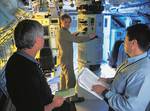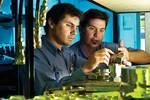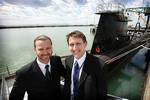Joint forces winning the skills war
 Engineering Engineering
In an Australian first, a new defence Masters degree will give South Australian engineers an edge over their interstate counterparts. Co-developed by industry partner ASC Pty Ltd and the University of Adelaide, the Master of Marine Engineering fills an important void in engineering education for specialist application on ships and submarines. Eleven ASC personnel from diverse engineering disciplines are the first students to participate in the program, with enrolments now open to the general public for 2007. Already the degree has generated enormous interest from engineers working in Australia's defence industry, as well as others hoping to gain the additional skills required to enter the defence market. Speaking at the Masters launch, ASC Managing Director Greg Tunny said the complexity of engineering projects undertaken on the Collins Class submarines and the air warfare destroyers reinforces the importance of the Masters degree. "Our submarine and destroyer programs present us with unique challenges, not least of which is having our staff equipped with the skills, knowledge and experience required to keep the submarines at their maximum capability," Mr Tunny said. "The Masters degree will greatly accelerate up-skilling and, in time, strengthen Australia's indigenous naval engineering capability." Professor James McWha, Vice-Chancellor of the University of Adelaide, said the new degree addressed skills shortages in the defence industry and would provide additional career opportunities for engineers. "This program represents an excellent example of industry and the University working closely together to create real benefits for the State and the nation," Professor McWha said. The postgraduate program has been made possible through funding from the Defence Materiel Organisation's Skilling Australia's Defence Industry Initiative. The degree was officially launched recently by South Australian Senator Cory Bernardi at ASC's submarine facility at Osborne, north of Adelaide. The Master of Marine Engineering is the only degree of its kind in Australia. The postgraduate degree is delivered by the University of Adelaide and ASC, with graduates receiving a formal University of Adelaide qualification upon completing the program. The Masters program comprises 12 courses (or subjects), comparable to an 18-month full-time program of study. The program fills an education gap for naval defence engineers, qualifies them to higher degree level and provides an incentive to attract new recruits and retain experienced personnel in the defence industry. The program consists of three types of courses: - core program courses in either submarines or naval ships;
- foundation courses in appropriate engineering streams, such as structural, mechanical and electrical engineering; and
- elective courses.
A Graduate Certificate and Graduate Diploma in Marine Engineering will also be offered by the University of Adelaide in addition to the Masters degree.
The University of Adelaide has many areas of strength in research and education that relate specifically to the defence and security industries. University research is accessible by government and industry groups and the University has longstanding relationships with both. Education is similarly offered to both groups at undergraduate and postgraduate levels. The Defence and Security Cluster was established at the University of Adelaide early last year to foster relationships between academics, defence and security/intelligence personnel, and industry-related personnel and companies. A key role is to foster inter-disciplinary research and integrated research between schools and faculties - for example, the combination of engineering and psychology to develop better surveillance systems, providing increased protection against security threats. The University runs various Masters-level programs - in addition to the recently announced Master of Marine Engineering (see story on Page 1), the University offers a Master of Electronic Engineering as part of the Continuing Education Program for the Defence Science and Technology Organisation (DSTO). MBAs and other general programs are also of interest to serving Defence members (military and civilian) as part of their on-going training. Adelaide has several Centres of Expertise in existence or in the process of being created and participates in a number of defence and security (counter-terrorism) programs and conferences. The University has signed a Memorandum of Understanding with DSTO and has a longstanding relationship with the DSTO across a number of faculties. Among the many areas of research expertise in defence and security at the University, involving industry and government partners, are: Centre of Expertise in Photonics - leading the world in the development of a new generation of optical fibres for application to both commercial and defence electronics. Centre of Expertise in Phased Array and Microwave Radar Systems (CEPAMiR) - underpinning efforts to tackle practical engineering problems associated with the design, development and integration of next generation phased array systems with application to radar, electronic warfare and satellite navigation. Also provides short courses and programs covering radar and defence electronics. Australian Centre for Visual Technologies (ACVT) - conducting groundbreaking work into networked video surveillance and 3D rendering, with application in the defence and security industries. Detection and Protection (Chemical, Microbiology, Civil) - security-based research in areas of blast, chemical and biological detection and protection. Participation in the Joint Strike Fighter (JSF) - projected to be the last manned fighter the US will ever build, the University is one of a restricted number of high-quality research universities in Australia that has been invited to participate in relevant research and development for capabilities required for this New Air Combat vehicle. For more information about the University's defence and security capabilities, visit the Defence and Security Cluster website www.adelaide.edu.au/desec/ or contact Adelaide Research & Innovation on (08) 8303 5020, www.adelaide.edu.au/aripl/
|








